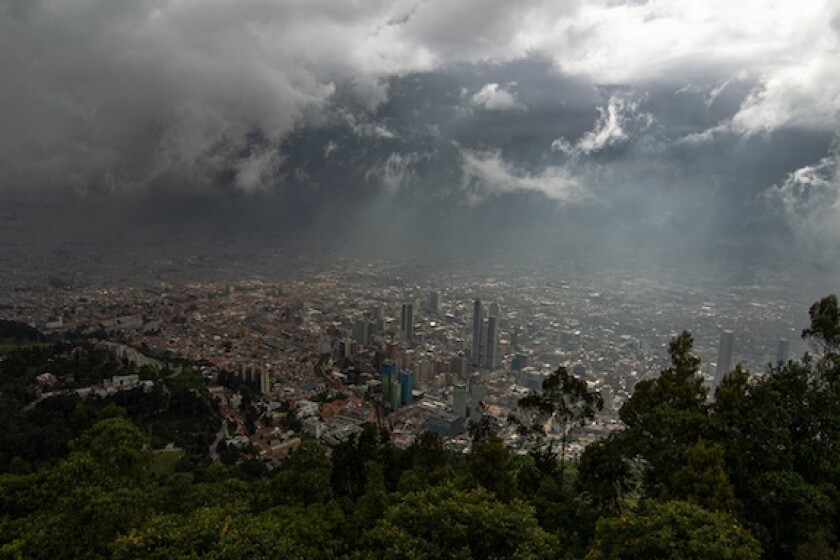Latin American primary markets were silent this week. While certain EM sovereigns are allegedly looking for the moment to pull the trigger on deals, they are “terrified” of volatile markets, say bankers.
Perhaps petrified would be a better description. When issuance does return, banker chatter will likely revolve — as it has for much of the past few weeks — around when Colombia might hit international markets. The sovereign is the notable absentee from the primary market so far in 2022, with its curve having been hurt by investor fears over left-wing presidential candidate Gustavo Petro, who has a convincing lead in opinion polls ahead of upcoming elections.
Even after a strong economic rebound in 2021 that slashed its 2022 funding needs, the sovereign is still slated to raise over $3bn in international bond markets this year. There is a theory mooted by more than one banker (though deemed far-fetched by others) that Colombia might be biding its time ahead of a potential rebound in bonds after the legislative election that will take place on Sunday.
This vote is likely to be a handy preview for May’s presidential election, when the left — in the shape of Petro — has probably its best ever chance of winning. The hypothesis of those who think a rally is imminent is that the election of a divided Congress this Sunday would limit the influence of a Petro presidency, and thus put a floor on downside risks.
GlobalCapital spoke to Sergio Guzmán, who runs political consultancy Colombia Risk Analysis in Bogotá, to discuss what’s at stake for bond investors on Sunday. Guzmán highlighted two things to keep an eye on: whether the new Congress is likely to provide checks and balances on the next president; and what the result says about the chances of fringe presidential candidates like Rodolfo Hernández and Ingrid Betancourt, who may have a crucial final say.
Sunday could also tell us whether the right wing, which is in power but with terrible approval ratings, has “lost as much oomph as it seems”. Typically, LatAm bond buyers warm to right-wing candidates, but on this occasion a strong showing from the right may have unexpected consequences — and not necessarily be a good thing for those bond investors who are afraid of Petro.
If right-wingers perform poorly on Sunday, “right-leaning voters could be more strategic with their choices in the first round of the presidential election, and back a more centrist president”, reckons Guzmán. The highly polarising Petro is unlikely to prosper in a face-off against a moderate.
Yet if right-wing voters are encouraged by Sunday’s results to back a more extreme candidate to the very end, it could work in Petro’s favour. In a head-to-head in the second round, Guzmán says Petro could “have a field day” against a candidate from the right whose support would also have a low ceiling. Indeed, this same dynamic in the second round helped lefties Pedro Castillo and Gabriel Boric to victory in Peru and Chile last year.
“It may appear counterintuitive, but investors may not want the right wing to have too strong a showing on Sunday,” says Guzmán. “This Colombian election is not about having your preferred choice — it’s about avoiding your least preferred option.”
We know who that is. At the GlobalCapital Bogotá bureau, pretty much every conversation with investors this year has ended with us being asked the trillion peso question: “will Petro win?”. We don’t know, is the short answer, and Guzmán has no crystal ball either. But we strongly recommend keeping up to date with his takes on Sunday’s developments and the presidential elections here.
Not so safe
Some speculated that next week’s Fed meeting could be the trigger for Colombia and other lingering sovereigns to proceed. Something is needed to lift the pessimism that was permeating LatAm DCM bankers this week. Doom and gloom was up a notch, with last week’s talk of Latin America becoming a safe haven from the Russia-Ukraine war somewhat fading.
There are some who think there could be opportunities in Latin America, thanks to its limited exposure to Russia. But one LatAm DCM head said this week that anyone who thinks that the region can be a safe haven is “not living on this planet”.
Less succinctly, we argued something similar in this week’s GlobalCapital View article. Any benefits from being isolated from Russia or from higher energy prices will likely be outweighed by broader trouble in emerging markets, and investors facing outflows. What’s more, higher inflation will stall the economic recovery and heighten political risks.
Petroperu, Peru’s state-owned oil company, is giving an exhibition of the perils of political risk for creditors. Fitch slashed the borrower to BBB- with a negative rating watch this week as a spat between the borrower and PwC led to delays in the company obtaining an audit for its 2021 financials, risking a covenant breach. Petroperu accuses the accountancy firm of making demands with “political connotations”. As we reported, the company’s bonds are plummeting — despite the surge in oil prices.
Finally, best of luck to Jorge Cortés, who many readers will know from the funding teams of Cabei and IDB Invest, who has just launched his investment advisory, Terrafort Capital.
Have a great weekend, and do get in touch for a free trial to access all of GlobalCapital.
Saludos,
Olly
This is GlobalCapital's LatAm Letter written weekly by Latin America reporter Oliver West. If you enjoy it, sign up for free in a matter of seconds here and feel free to pass it on to colleagues and contacts.
The best of this week’s LatAm bond coverage:
GlobalCapital view: It's too early to start calling Latin America a safe haven (free-to-read)

